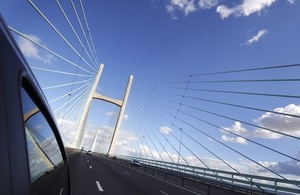Drivers to benefit from free Severn crossings from 2018
Welsh Secretary announces Severn tolls will be abolished by the end of next year

Drivers will see an end to tolls on the Severn Crossings in 2018, Secretary of State for Wales Alun Cairns announced today (21 July 2017).
The announcement comes as families prepare to take to the roads for the great summer getaway.
The Severn Crossings are iconic landmarks which have served commuters, businesses and local communities in Wales and England for over 50 years.
The bridges are used by more than 25 million vehicles each year, saving significant travel time and distance for commuters and drivers using the M4 motorway.
However, the tolls on both Severn Crossings have been seen as an economic and symbolic barrier to Wales’ future prosperity.
Today the UK Government is delivering on the promise made to the people of Wales by the Prime Minister in May and has confirmed that it will abolish the tolls to all vehicles at the end of 2018.
It is estimated that this announcement would boost the economy of South Wales by around £100 million a year** and the average motorist could save over £1,400 per year***.
Secretary of State for Wales Alun Cairns said:
The decision to abolish the Severn tolls next year sends a powerful message to businesses, commuters and tourists alike that the UK Government is committed to strengthening the Welsh economy.
By ending tolls for the 25 million annual journeys between two nations we will strengthen the links between communities and help to transform the joint economic prospects of South Wales and the South West of England.
I want to ensure that visitors and investors know what Wales has to offer socially, culturally and economically. Most importantly, I want the world to know how accessible we are to business. The decision we have taken today is right for Wales’ future prosperity and I am sure that it will be welcomed by industry and motorists alike.
When the bridges come under public ownership, they will be run by Highways England. Previously it has been run by Severn River Crossing plc.
Transport Secretary Chris Grayling said:
Tens of millions of motorists a year will benefit from the end of tolls on the Severn bridges, saving them money and cutting journey times. People who use the crossing every day will save a minimum of £115 a month.
Abolishing the crossing fee will also drive economic growth for businesses in Wales and the South West and further strengthen the bond between our two great countries.
The Secretary of State for Wales will announce the news to an audience of business representatives from South West of England and South Wales at an event at Newport based Owens Group.
Ian Gallagher, Head of Policy for South West and Wales Freight Transport Association welcomed the announcement:
This announcement today is excellent news for the growth of the Welsh and South West Economies, a real shot in the arm for those businesses and commuters who use the bridges on a daily basis.
Removal of the tolls altogether has been a long-term policy position for the Freight Transport Association, with members on both side of the bridges incurring some of the highest tolls charges in the UK, money better spent on upskilling, recruitment and purchasing greener vehicles.
Notes to Editors
** Welsh Government: The Impact of the Severn Tolls on the Welsh Economy, 30 May 2012
**Based on a monthly tag charge of £117.92 over 12 months
-
The Severn Bridge was built in 1966 and a second crossing was completed 30 years later.
-
The first Severn Bridge was opened in September 1966, providing a direct link from the M4 motorway into Wales, with a toll in place for use of the bridge to pay for the cost of construction. It continually operated above capacity and in 1986 the then Government stated that a second bridge would be constructed.
-
In 1988 it was announced that tenders would be invited from private consortia to fund, build and operate the second bridge and take over the operation of the first bridge. In 1990 the concession was awarded to Severn River Crossing PLC (“SRC”). Construction work also started in April 1992 and the second bridge was opened in June 1996.